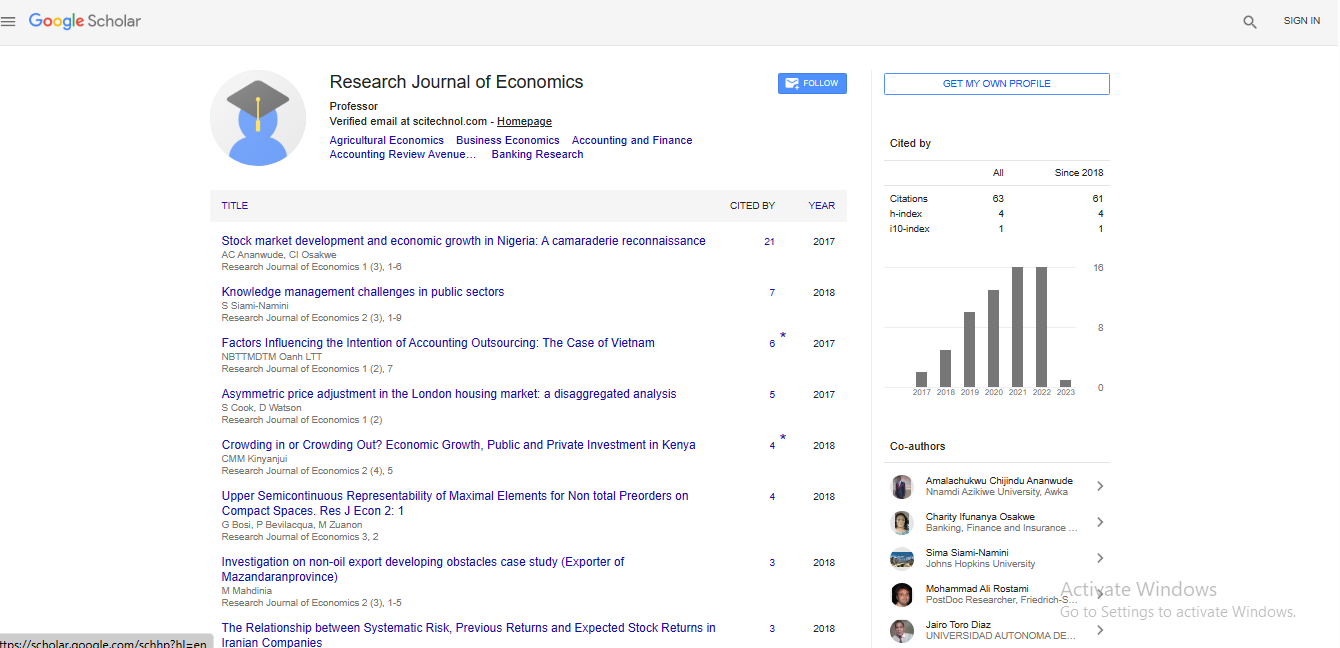Perspective, Res J Econ Vol: 7 Issue: 4
Digital Age Financial Literacy: Navigating Complexities and Opportunities
Gifnac Tabi Martin*
1Department of Accounting, Walter Sisulu University, Mthatha, South Africa
*Corresponding Author: Gifnac Tabi Martin,
Department of Accounting, Walter Sisulu University, Mthatha, South Africa
E-mail: gmatin@wsu.ac.za
Received date: 28 June, 2023, Manuscript No. RJE-23-113058;
Editor assigned date: 30 June, 2023, PreQC No. RJE-23-113058 (PQ);
Reviewed date: 14 July, 2023, QC No. RJE-23-113058;
Revised date: 21 July, 2023, Manuscript No. RJE-23-113058 (R);
Published date: 28 July, 2023, DOI: 10.4172/RJE.1000159
Citation: Martin GT (2023) Digital Age Financial Literacy: Navigating Complexities and Opportunities. Res J Econ 7:4.
Description
Financial literacy is the foundation of personal financial well-being, enabling individuals to make informed and effective financial decisions. Financial literacy is the ability to understand and effectively manage one's financial resources. It empowers individuals to navigate complex financial systems and make informed choices. In the digital age, financial literacy takes on new dimensions as technology transforms how individuals manage their finances. The digital age has reshaped financial transactions, offering convenience and challenges that require enhanced financial literacy.
Understanding income and expenses, creating budgets, and developing saving habits. Grasping concepts like interest rates, credit scores, and responsible borrowing. Knowing different investment options, risk assessment, and potential returns. Understanding insurance, emergency funds, and managing unforeseen financial challenges. Digital advancements have redefined financial literacy, requiring individuals to adapt to new technologies and navigate digital financial landscapes safely. By embracing digital tools, learning about cybersecurity, and practicing responsible online financial behaviors, individuals can harness the opportunities of the digital age while protecting their financial interests.
Navigating digital interfaces for account management, transactions, and bill payments. Understanding and using mobile payment apps for transactions and peer-to-peer transfers. Grasping the basics of digital currencies like Bitcoin and their investment implications. Digital platforms can employ behavioral insights to encourage positive financial behaviors. Digital tools can help individuals resist impulsive spending and maintain financial discipline. Advocating for regulations that safeguard consumers in the digital financial space. Calling for clear and transparent communication from digital financial service providers.
Opportunities and challenges
Organize and conduct financial literacy workshops for individuals or groups in your community, schools, or workplaces. Topics can include budgeting, saving, investing, and debt management. Create and sell online courses or host webinars on financial literacy topics through platforms like Coursera, or your own website. This allows you to reach a global audience. Start a blog or YouTube channel focused on financial literacy. You can generate income through advertising, affiliate marketing, or sponsored content. Develop or promote financial literacy apps and tools that help individuals track their spending, save money, or invest wisely. Create educational materials or curricula for schools and colleges, or offer your expertise to educational institutions to improve their financial literacy programs. Join or start a nonprofit organization dedicated to promoting financial literacy in underserved communities. These organizations often provide free workshops and resources. Become a certified financial advisor or planner to offer comprehensive financial advice and planning services to clients. Partner with banks, credit unions, or financial institutions to offer financial literacy workshops or resources to their customers.
Use social media platforms to share financial tips, create engaging content, and build an online community around financial literacy. Explore opportunities to work with government agencies or initiatives aimed at improving financial literacy at a national or local level. Financially literate individuals can evaluate options and choose the most suitable financial products and services. Financial literacy helps individuals avoid excessive debt and understand the implications of credit. Individuals with financial literacy can plan for retirement, education, and other long-term goals. Improved financial literacy contributes to personal financial stability and overall economic wellbeing.
Many individuals lack access to comprehensive financial education. Complex financial products and terminology can be daunting for those without financial education. Recognizing online threats and practicing safe online financial behaviors. Understanding data collection and sharing, and the implications for personal financial information. Identifying common online scams and taking precautions against identity theft. Recognizing that financial practices and needs vary across cultures. Providing financial education materials in various languages to reach diverse communities. Behavioral biases can lead to poor financial decisions, regardless of financial literacy levels. Tailoring financial literacy programs to accommodate individuals with varying levels of financial literacy. Encouraging continuous learning to keep up with evolving financial landscapes
Conclusion
Financial literacy is an essential life skill that empowers individuals to make sound financial decisions, achieve goals, and secure their financial futures. By understanding basic financial concepts, individuals can navigate financial challenges with confidence and work toward economic stability. Promoting financial literacy through education, accessible resources, and cultural sensitivity contributes to individual well-being and the overall financial health of society. As technology continues to shape the way we manage money, digital financial literacy becomes an indispensable skill for individuals seeking to thrive in the evolving financial ecosystem.
 Spanish
Spanish  Chinese
Chinese  Russian
Russian  German
German  French
French  Japanese
Japanese  Portuguese
Portuguese  Hindi
Hindi 